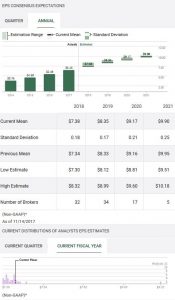Contents
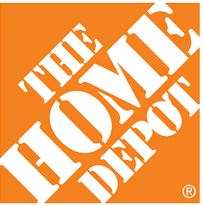 Summary
Summary
- This Home Depot Stock Analysis is based on Q3 results reported November 14, 2017 which includes increased diluted EPS guidance to $7.36 which is growth of approximately ~14% from fiscal 2016.
- It is one of a handful of companies with monster share buyback programs. A $15B share buyback program was authorized in early 2017.
- HD has reduced the number of outstanding shares by ~490 Million since early 2008 and long-term debt has increased by ~$11B.
- Strong free cash flow should enable HD to service/retire its debt obligations when due but HD can’t continue in perpetuity to boost its dividend and share price through the use of debt.
Introduction
Home Depot (NYSE: HD) released its Q3 2017 results November 14, 2017.
The company continues to perform admirably and has rewarded shareholders handsomely over the last several years. Its ability to continue to do so, however, depends very heavily on the state of the US economy. Despite rhetoric coming from The White House, there are signs that all is not well. Since HD’s performance is so heavily reliant on its customer base having sufficient free cash flow, or access to credit, HD is vulnerable to a pull back in its stock price.
HD’s stock price and dividend growth has also been fueled through the use of long-term debt. This can’t go on in perpetuity.
Risks
As at 2015 roughly 80% of homes in the US were 20+ years old. In addition, a substantial number of homes built before the crash of the real estate bubble (~10 – 15 years ago) suffered from shoddy workmanship as builders scrambled to meet demand and there was a shortage of skilled trade. These are two factors that favor HD’s continued growth.
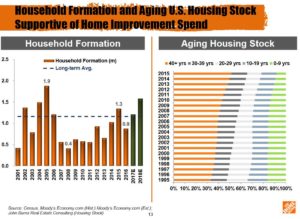 Source: HD Australia/Asia July 2017 presentation
Source: HD Australia/Asia July 2017 presentation
My concern, however, is that in the current Fear of Missing Out (“FOMO”) investing environment many investors are overlooking some of the key risks that could derail the remarkable performance of some companies over the last several years.
In the case of HD, I look at some of the recent data recently released from The Federal Reserve Bank of New York and question whether HD’s string of successes will encounter a speed bump within the next 12 – 18 months.
The average North American citizen has a significant amount of debt. The Q3 2017 FRBNY Quarterly Report on Household Debt and Credit reveals that total household debt has reached a new peak in Q3 2017. At $12.96T it is $280B above the previous 2008 Q3 high.
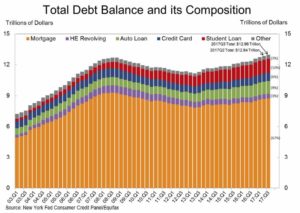
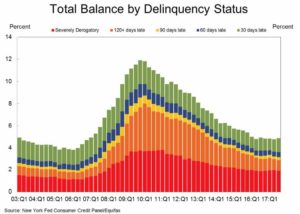 Source: FRBNY Q3 2017 Quarterly Report on Household Debt and Credit
Source: FRBNY Q3 2017 Quarterly Report on Household Debt and Credit
If you look the “Risk Factors” section found under Item 1A in HD’s 10-K for the fiscal year ending January 29, 2017 you will see the following risk:
“Uncertainty regarding the housing market, economic conditions, political climate and other factors beyond our control could adversely affect demand for our products and services, our costs of doing business and our financial performance.”
HD is fully aware that an economic downturn, whether mild or as serious as that experienced during the Financial Crisis, can have a significant negative impact on its performance.
Q3 2017 Results and Guidance for Remainder of 2017
On November 14, 2017, HD released its Q3 2017 results.
HD raised its fiscal 2017 sales growth guidance and its diluted EPS growth guidance; diluted EPS of $7.36 is now projected which represents growth of ~14% from fiscal 2016. This growth guidance includes the impact of $8B of repurchased shares for fiscal 2017.
This brings me to my observation on HD’s use of debt to retire outstanding shares.
Management has certainly been extremely astute in taking on very inexpensive debt to repurchase shares over the past several years as reflected in the following chart.
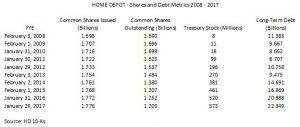 The following schedule reflects HD’s long-term debt.
The following schedule reflects HD’s long-term debt.
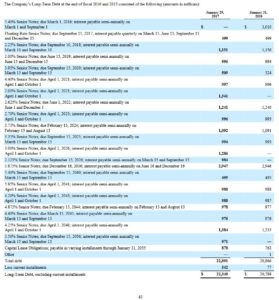 Source: HD 10-K for FY ending January 29, 2017 (page 47 of 85)
Source: HD 10-K for FY ending January 29, 2017 (page 47 of 85)
Subsequent to the above, HD raised $1B as per this 8-K and $1B as per this 8-K; this new debt matures in 2027.
While debt has certainly ballooned in recent years I don’t foresee a problem with respect to debt service as evidenced by the following debt maturity profile.
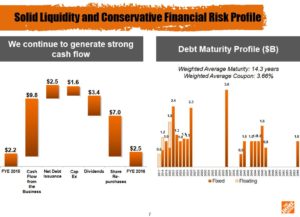 Source: HD Australia/Asia July 2017 presentation
Source: HD Australia/Asia July 2017 presentation
In addition, HD typically generates strong free cash flow every year. It had $6.239B, $6.8B, $7.87B, and $8.162B in free cash flow in the fiscal years ending January 2014 – 2017. This provides the company with sufficient flexibility to grow the business, increase dividends, and to repay debt as deemed appropriate. If there were any concern with respect to the level of debt HD is taking on, I strongly suspect Moody’s would not have affirmed HD's A2 unsecured ratings in May 2017.
The question I ask myself is what will happen once HD’s $15B share buyback program comes to an end? At some stage, I envision HD will scale back its level of share repurchases. Once this occurs, to what extent will the growth in diluted EPS diminish thus impacting investors’ expectations? Will HD’s PE ratio drop since investors are no longer willing to pay up for slower EPS growth? Granted, this may not occur within the next couple of years but I can’t envision HD maintaining this torrid share repurchase rate in perpetuity.
Dividend, Dividend Yield, and Dividend Payout Ratio
HD’s current dividend yield is ~2.1% ($0.89/quarter dividend) based on a $167.80 closing stock price on November 14, 2017.
HD has certainly aptly rewarded investors in recent years with sizable dividend increases.
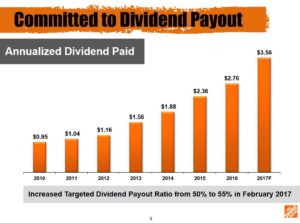 Source: HD Australia/Asia July 2017 presentation
Source: HD Australia/Asia July 2017 presentation
This has not always been the case as evidenced by its spotty dividend history. Investors fixated on investing in companies with a long-term track record of dividend increases may want to look at what happened to HD’s dividend starting late 2006 until late 2010.
HD has maintained a sub 45% dividend payout ratio for the last several years. In February 2017, however, HD increased its targeted dividend payout ratio from 50% to 55%.
Valuation
As previously noted, HD expects diluted EPS of $7.36 for the current fiscal year. This translates into a ~22.8 PE based on the current $167.80 closing stock price. The mean EPS for the next fiscal year based on estimates from multiple analysts is $8.35 for a forward PE of 20.
This is not a totally unreasonable level. Readers need to remember, however, that HD is a cyclical business.
At the moment it is firing on all cylinders and its healthy dividend and sizable buyback program have certainly had a huge impact on the stock price.
I am concerned, however, as to what will be the impact if interest rates start to rise. As it is, many households are currently living on the edge and here we are in a low interest rate environment! Will the projected interest rate increases be enough to push many homeowners over the edge? If so, I suspect HD’s stock price might experience a pullback.
Home Depot Stock Analysis - Final Thoughts
In 2003 HD had 2.36B shares outstanding. Now the level is below 1.2B. Will this typically have a positive impact on a company’s stock price? Of course, it will.
Perhaps I am old school but I was taught that share buybacks were to be used to offset the increase in the number of shares outstanding resulting from exercised stock options. Clearly, this has changed over the past couple of decades; this has been aided and abetted in recent years by an extremely low interest rate environment.
I do not dispute that HD is a good business and does not have a great future. I just have a tough time determining whether the actions taken by the company to load up on debt to reduce share count and increase dividends for long time shareholders is going to come at the expense of new shareholders. I will, therefore, pass on investing in HD unless there is another market meltdown and valuation levels approach Financial Crisis levels.
I wish you much success on your journey to financial freedom.
Thanks for reading!
Note: I sincerely appreciate the time you took to read this post. As always, please leave any feedback and questions you may have in the “Contact Me Here” section to the right.
Disclaimer: I have no knowledge of your individual circumstances and am not providing individualized advice or recommendations. I encourage you not to make any investment decision without conducting your own research and due diligence. You should also consult your financial advisor about your specific situation.
Disclosure: I currently do not hold a position in HD and do not intend to initiate a position within the next 72 hours unless the price drops to my target levels.
I wrote this article myself and it expresses my own opinions. I am not receiving compensation for it and have no business relationship with any company whose stock is mentioned in this article.
My Amazon picks.


